CONTRACT LAW. Contract Law [Author Name(s), First M. La
VerifiedAdded on 2023/01/06
|6
|1290
|78
AI Summary
Contribute Materials
Your contribution can guide someone’s learning journey. Share your
documents today.
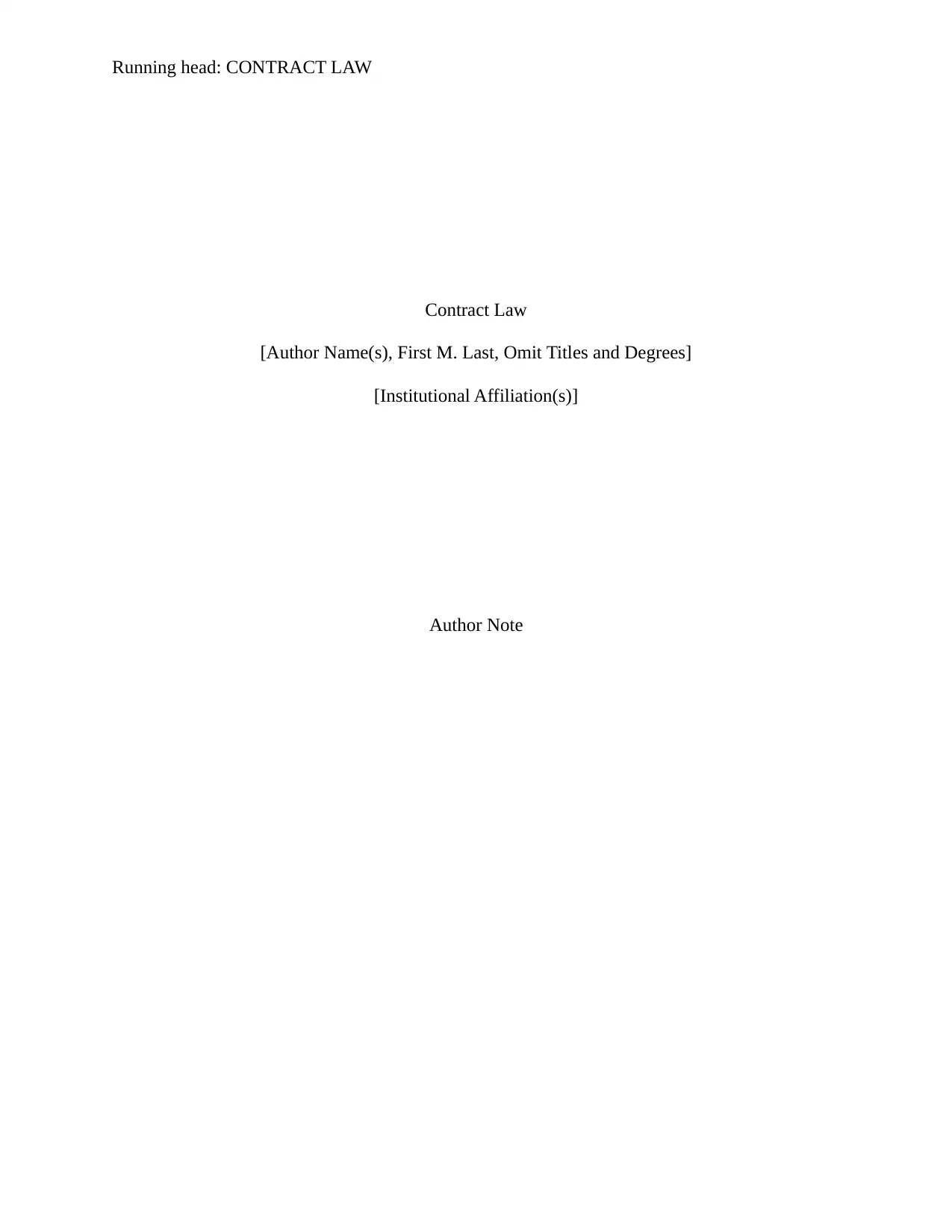
Running head: CONTRACT LAW
Contract Law
[Author Name(s), First M. Last, Omit Titles and Degrees]
[Institutional Affiliation(s)]
Author Note
Contract Law
[Author Name(s), First M. Last, Omit Titles and Degrees]
[Institutional Affiliation(s)]
Author Note
Secure Best Marks with AI Grader
Need help grading? Try our AI Grader for instant feedback on your assignments.
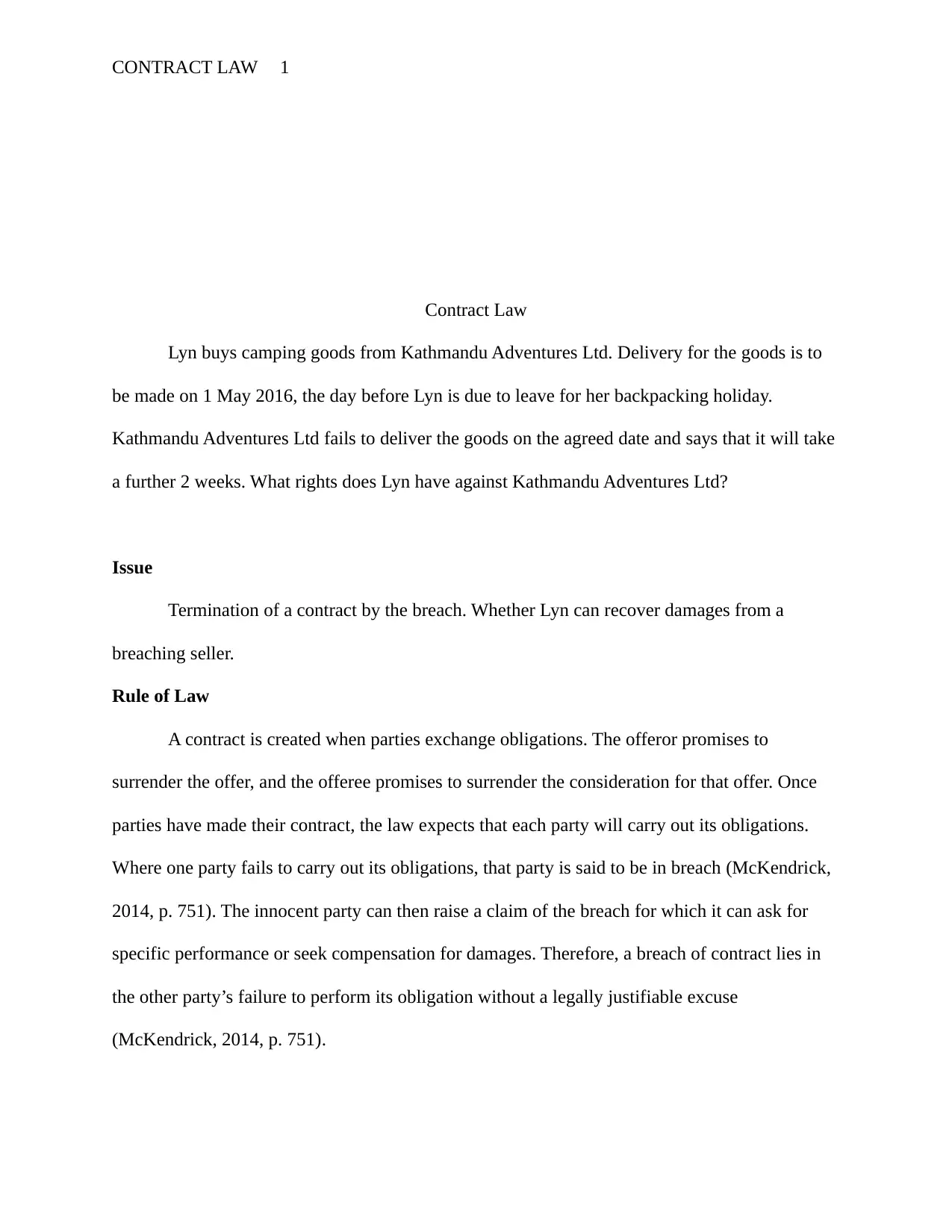
CONTRACT LAW 1
Contract Law
Lyn buys camping goods from Kathmandu Adventures Ltd. Delivery for the goods is to
be made on 1 May 2016, the day before Lyn is due to leave for her backpacking holiday.
Kathmandu Adventures Ltd fails to deliver the goods on the agreed date and says that it will take
a further 2 weeks. What rights does Lyn have against Kathmandu Adventures Ltd?
Issue
Termination of a contract by the breach. Whether Lyn can recover damages from a
breaching seller.
Rule of Law
A contract is created when parties exchange obligations. The offeror promises to
surrender the offer, and the offeree promises to surrender the consideration for that offer. Once
parties have made their contract, the law expects that each party will carry out its obligations.
Where one party fails to carry out its obligations, that party is said to be in breach (McKendrick,
2014, p. 751). The innocent party can then raise a claim of the breach for which it can ask for
specific performance or seek compensation for damages. Therefore, a breach of contract lies in
the other party’s failure to perform its obligation without a legally justifiable excuse
(McKendrick, 2014, p. 751).
Contract Law
Lyn buys camping goods from Kathmandu Adventures Ltd. Delivery for the goods is to
be made on 1 May 2016, the day before Lyn is due to leave for her backpacking holiday.
Kathmandu Adventures Ltd fails to deliver the goods on the agreed date and says that it will take
a further 2 weeks. What rights does Lyn have against Kathmandu Adventures Ltd?
Issue
Termination of a contract by the breach. Whether Lyn can recover damages from a
breaching seller.
Rule of Law
A contract is created when parties exchange obligations. The offeror promises to
surrender the offer, and the offeree promises to surrender the consideration for that offer. Once
parties have made their contract, the law expects that each party will carry out its obligations.
Where one party fails to carry out its obligations, that party is said to be in breach (McKendrick,
2014, p. 751). The innocent party can then raise a claim of the breach for which it can ask for
specific performance or seek compensation for damages. Therefore, a breach of contract lies in
the other party’s failure to perform its obligation without a legally justifiable excuse
(McKendrick, 2014, p. 751).
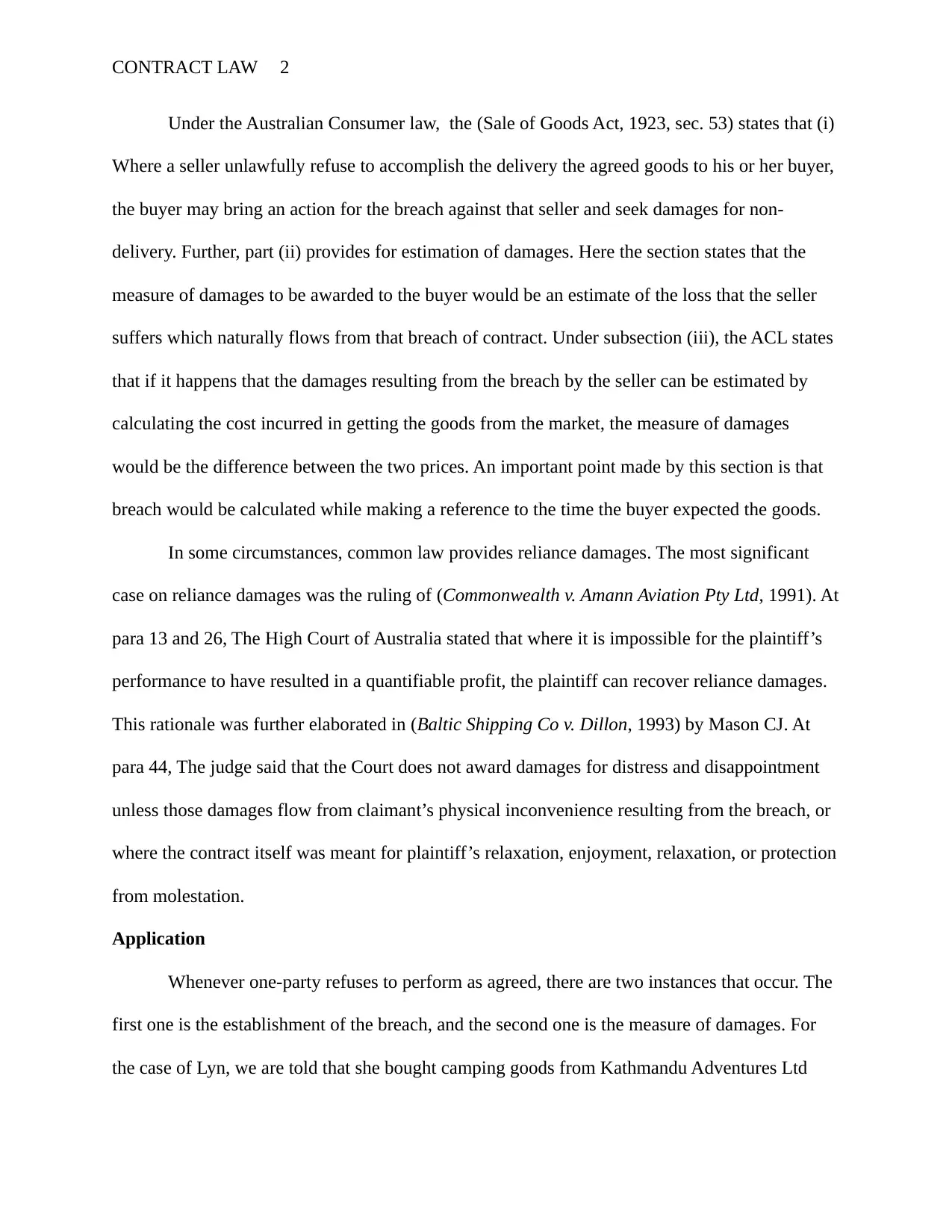
CONTRACT LAW 2
Under the Australian Consumer law, the (Sale of Goods Act, 1923, sec. 53) states that (i)
Where a seller unlawfully refuse to accomplish the delivery the agreed goods to his or her buyer,
the buyer may bring an action for the breach against that seller and seek damages for non-
delivery. Further, part (ii) provides for estimation of damages. Here the section states that the
measure of damages to be awarded to the buyer would be an estimate of the loss that the seller
suffers which naturally flows from that breach of contract. Under subsection (iii), the ACL states
that if it happens that the damages resulting from the breach by the seller can be estimated by
calculating the cost incurred in getting the goods from the market, the measure of damages
would be the difference between the two prices. An important point made by this section is that
breach would be calculated while making a reference to the time the buyer expected the goods.
In some circumstances, common law provides reliance damages. The most significant
case on reliance damages was the ruling of (Commonwealth v. Amann Aviation Pty Ltd, 1991). At
para 13 and 26, The High Court of Australia stated that where it is impossible for the plaintiff’s
performance to have resulted in a quantifiable profit, the plaintiff can recover reliance damages.
This rationale was further elaborated in (Baltic Shipping Co v. Dillon, 1993) by Mason CJ. At
para 44, The judge said that the Court does not award damages for distress and disappointment
unless those damages flow from claimant’s physical inconvenience resulting from the breach, or
where the contract itself was meant for plaintiff’s relaxation, enjoyment, relaxation, or protection
from molestation.
Application
Whenever one-party refuses to perform as agreed, there are two instances that occur. The
first one is the establishment of the breach, and the second one is the measure of damages. For
the case of Lyn, we are told that she bought camping goods from Kathmandu Adventures Ltd
Under the Australian Consumer law, the (Sale of Goods Act, 1923, sec. 53) states that (i)
Where a seller unlawfully refuse to accomplish the delivery the agreed goods to his or her buyer,
the buyer may bring an action for the breach against that seller and seek damages for non-
delivery. Further, part (ii) provides for estimation of damages. Here the section states that the
measure of damages to be awarded to the buyer would be an estimate of the loss that the seller
suffers which naturally flows from that breach of contract. Under subsection (iii), the ACL states
that if it happens that the damages resulting from the breach by the seller can be estimated by
calculating the cost incurred in getting the goods from the market, the measure of damages
would be the difference between the two prices. An important point made by this section is that
breach would be calculated while making a reference to the time the buyer expected the goods.
In some circumstances, common law provides reliance damages. The most significant
case on reliance damages was the ruling of (Commonwealth v. Amann Aviation Pty Ltd, 1991). At
para 13 and 26, The High Court of Australia stated that where it is impossible for the plaintiff’s
performance to have resulted in a quantifiable profit, the plaintiff can recover reliance damages.
This rationale was further elaborated in (Baltic Shipping Co v. Dillon, 1993) by Mason CJ. At
para 44, The judge said that the Court does not award damages for distress and disappointment
unless those damages flow from claimant’s physical inconvenience resulting from the breach, or
where the contract itself was meant for plaintiff’s relaxation, enjoyment, relaxation, or protection
from molestation.
Application
Whenever one-party refuses to perform as agreed, there are two instances that occur. The
first one is the establishment of the breach, and the second one is the measure of damages. For
the case of Lyn, we are told that she bought camping goods from Kathmandu Adventures Ltd
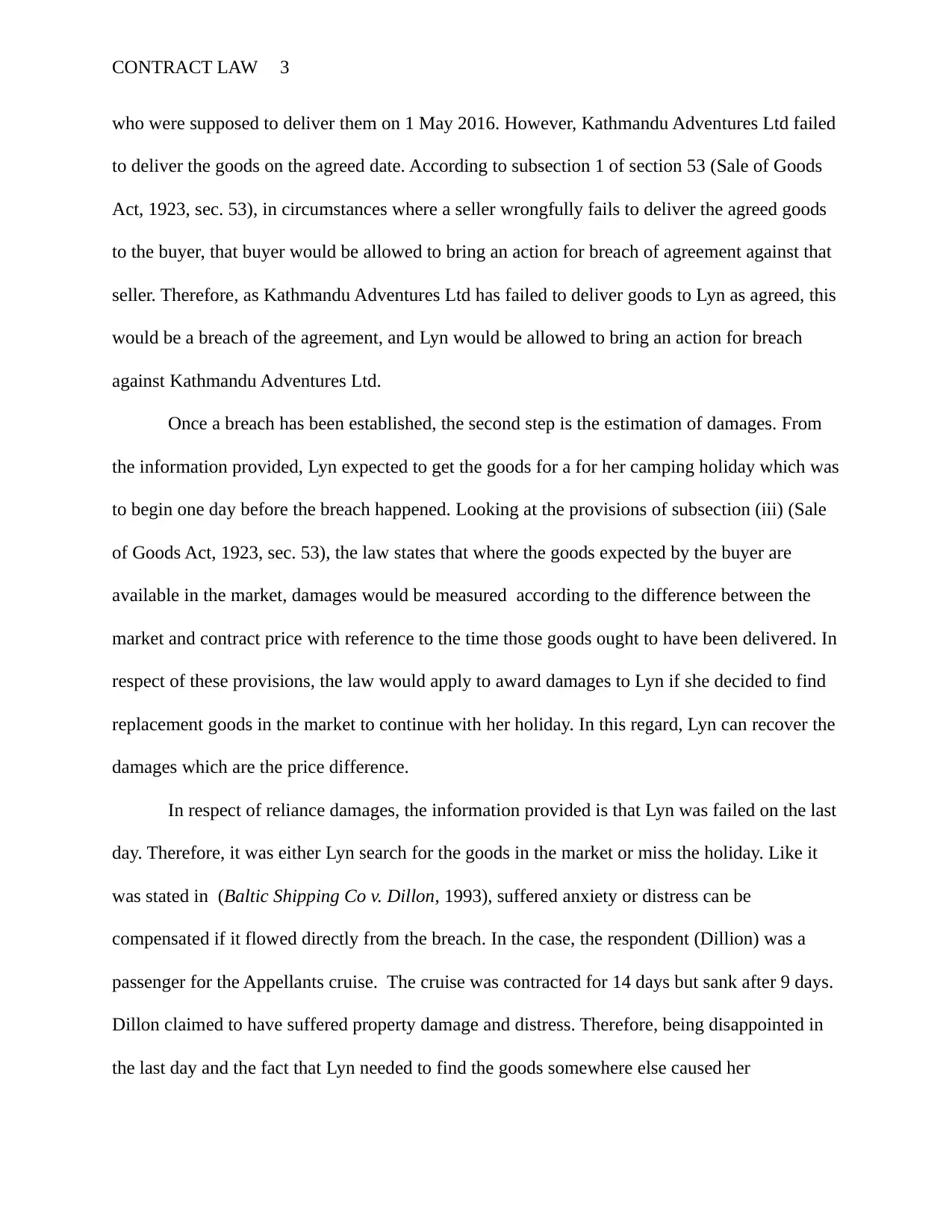
CONTRACT LAW 3
who were supposed to deliver them on 1 May 2016. However, Kathmandu Adventures Ltd failed
to deliver the goods on the agreed date. According to subsection 1 of section 53 (Sale of Goods
Act, 1923, sec. 53), in circumstances where a seller wrongfully fails to deliver the agreed goods
to the buyer, that buyer would be allowed to bring an action for breach of agreement against that
seller. Therefore, as Kathmandu Adventures Ltd has failed to deliver goods to Lyn as agreed, this
would be a breach of the agreement, and Lyn would be allowed to bring an action for breach
against Kathmandu Adventures Ltd.
Once a breach has been established, the second step is the estimation of damages. From
the information provided, Lyn expected to get the goods for a for her camping holiday which was
to begin one day before the breach happened. Looking at the provisions of subsection (iii) (Sale
of Goods Act, 1923, sec. 53), the law states that where the goods expected by the buyer are
available in the market, damages would be measured according to the difference between the
market and contract price with reference to the time those goods ought to have been delivered. In
respect of these provisions, the law would apply to award damages to Lyn if she decided to find
replacement goods in the market to continue with her holiday. In this regard, Lyn can recover the
damages which are the price difference.
In respect of reliance damages, the information provided is that Lyn was failed on the last
day. Therefore, it was either Lyn search for the goods in the market or miss the holiday. Like it
was stated in (Baltic Shipping Co v. Dillon, 1993), suffered anxiety or distress can be
compensated if it flowed directly from the breach. In the case, the respondent (Dillion) was a
passenger for the Appellants cruise. The cruise was contracted for 14 days but sank after 9 days.
Dillon claimed to have suffered property damage and distress. Therefore, being disappointed in
the last day and the fact that Lyn needed to find the goods somewhere else caused her
who were supposed to deliver them on 1 May 2016. However, Kathmandu Adventures Ltd failed
to deliver the goods on the agreed date. According to subsection 1 of section 53 (Sale of Goods
Act, 1923, sec. 53), in circumstances where a seller wrongfully fails to deliver the agreed goods
to the buyer, that buyer would be allowed to bring an action for breach of agreement against that
seller. Therefore, as Kathmandu Adventures Ltd has failed to deliver goods to Lyn as agreed, this
would be a breach of the agreement, and Lyn would be allowed to bring an action for breach
against Kathmandu Adventures Ltd.
Once a breach has been established, the second step is the estimation of damages. From
the information provided, Lyn expected to get the goods for a for her camping holiday which was
to begin one day before the breach happened. Looking at the provisions of subsection (iii) (Sale
of Goods Act, 1923, sec. 53), the law states that where the goods expected by the buyer are
available in the market, damages would be measured according to the difference between the
market and contract price with reference to the time those goods ought to have been delivered. In
respect of these provisions, the law would apply to award damages to Lyn if she decided to find
replacement goods in the market to continue with her holiday. In this regard, Lyn can recover the
damages which are the price difference.
In respect of reliance damages, the information provided is that Lyn was failed on the last
day. Therefore, it was either Lyn search for the goods in the market or miss the holiday. Like it
was stated in (Baltic Shipping Co v. Dillon, 1993), suffered anxiety or distress can be
compensated if it flowed directly from the breach. In the case, the respondent (Dillion) was a
passenger for the Appellants cruise. The cruise was contracted for 14 days but sank after 9 days.
Dillon claimed to have suffered property damage and distress. Therefore, being disappointed in
the last day and the fact that Lyn needed to find the goods somewhere else caused her
Secure Best Marks with AI Grader
Need help grading? Try our AI Grader for instant feedback on your assignments.
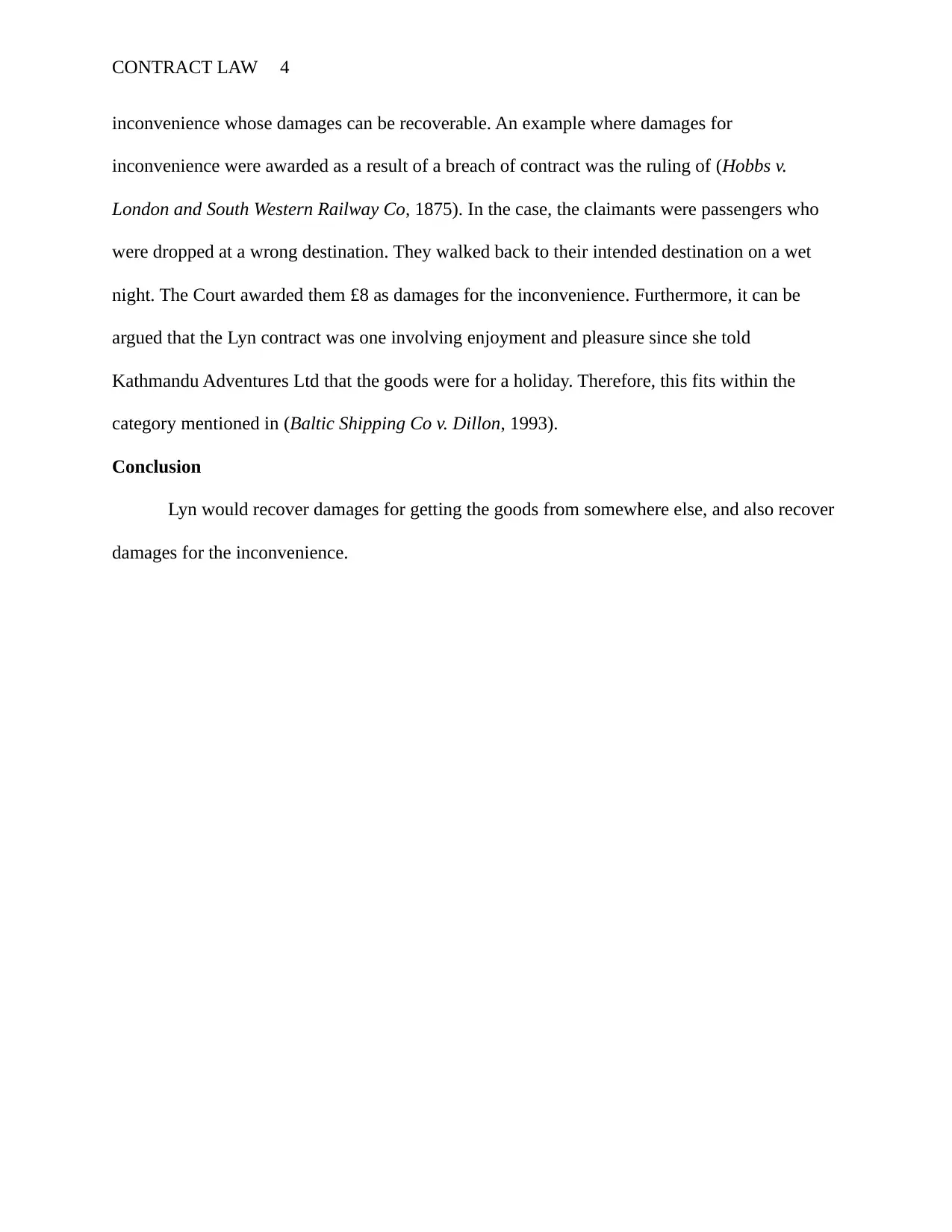
CONTRACT LAW 4
inconvenience whose damages can be recoverable. An example where damages for
inconvenience were awarded as a result of a breach of contract was the ruling of (Hobbs v.
London and South Western Railway Co, 1875). In the case, the claimants were passengers who
were dropped at a wrong destination. They walked back to their intended destination on a wet
night. The Court awarded them £8 as damages for the inconvenience. Furthermore, it can be
argued that the Lyn contract was one involving enjoyment and pleasure since she told
Kathmandu Adventures Ltd that the goods were for a holiday. Therefore, this fits within the
category mentioned in (Baltic Shipping Co v. Dillon, 1993).
Conclusion
Lyn would recover damages for getting the goods from somewhere else, and also recover
damages for the inconvenience.
inconvenience whose damages can be recoverable. An example where damages for
inconvenience were awarded as a result of a breach of contract was the ruling of (Hobbs v.
London and South Western Railway Co, 1875). In the case, the claimants were passengers who
were dropped at a wrong destination. They walked back to their intended destination on a wet
night. The Court awarded them £8 as damages for the inconvenience. Furthermore, it can be
argued that the Lyn contract was one involving enjoyment and pleasure since she told
Kathmandu Adventures Ltd that the goods were for a holiday. Therefore, this fits within the
category mentioned in (Baltic Shipping Co v. Dillon, 1993).
Conclusion
Lyn would recover damages for getting the goods from somewhere else, and also recover
damages for the inconvenience.
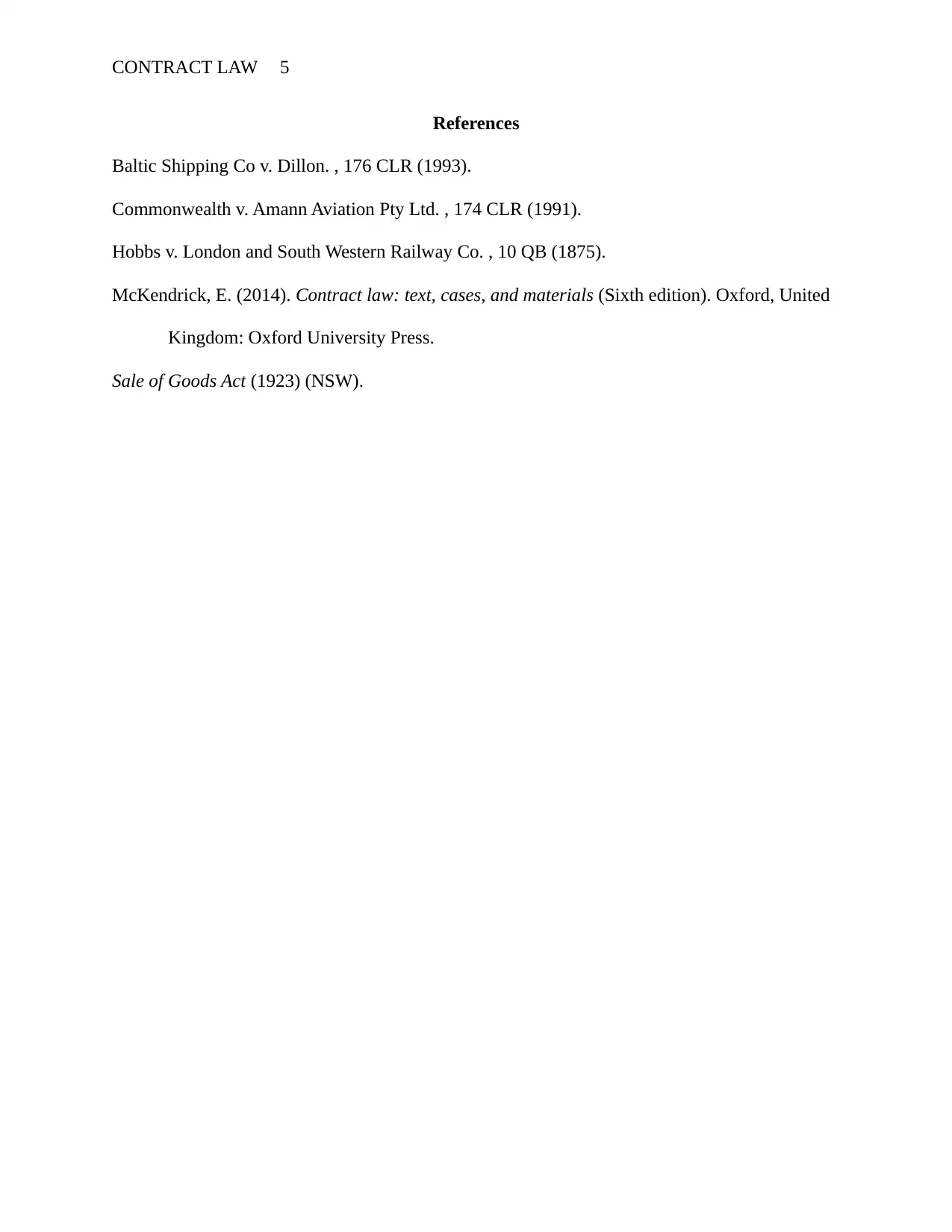
CONTRACT LAW 5
References
Baltic Shipping Co v. Dillon. , 176 CLR (1993).
Commonwealth v. Amann Aviation Pty Ltd. , 174 CLR (1991).
Hobbs v. London and South Western Railway Co. , 10 QB (1875).
McKendrick, E. (2014). Contract law: text, cases, and materials (Sixth edition). Oxford, United
Kingdom: Oxford University Press.
Sale of Goods Act (1923) (NSW).
References
Baltic Shipping Co v. Dillon. , 176 CLR (1993).
Commonwealth v. Amann Aviation Pty Ltd. , 174 CLR (1991).
Hobbs v. London and South Western Railway Co. , 10 QB (1875).
McKendrick, E. (2014). Contract law: text, cases, and materials (Sixth edition). Oxford, United
Kingdom: Oxford University Press.
Sale of Goods Act (1923) (NSW).
1 out of 6
Related Documents
Your All-in-One AI-Powered Toolkit for Academic Success.
+13062052269
info@desklib.com
Available 24*7 on WhatsApp / Email
![[object Object]](/_next/static/media/star-bottom.7253800d.svg)
Unlock your academic potential
© 2024 | Zucol Services PVT LTD | All rights reserved.





